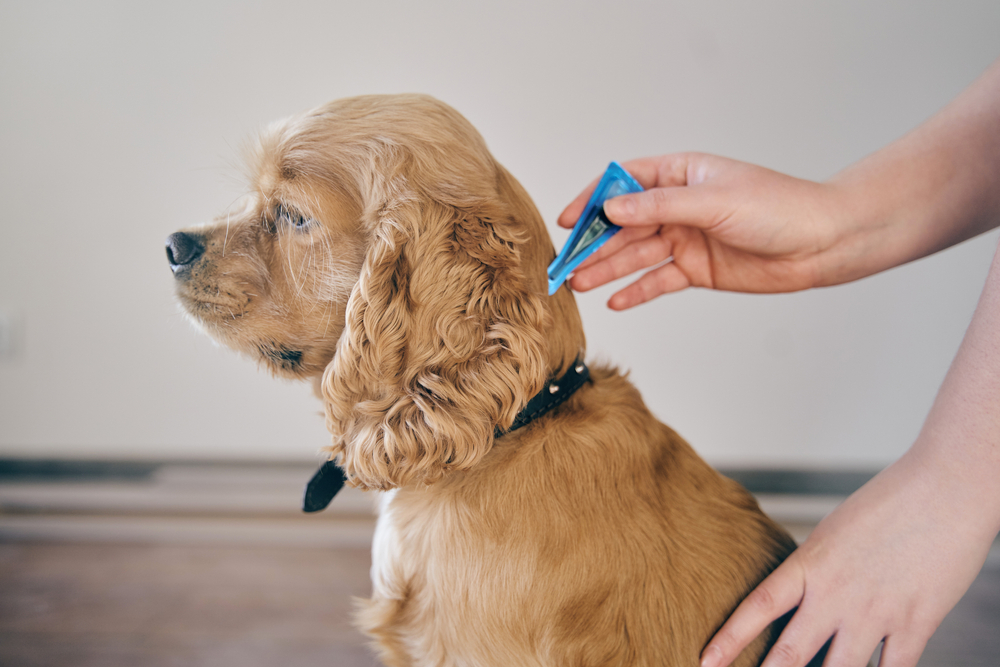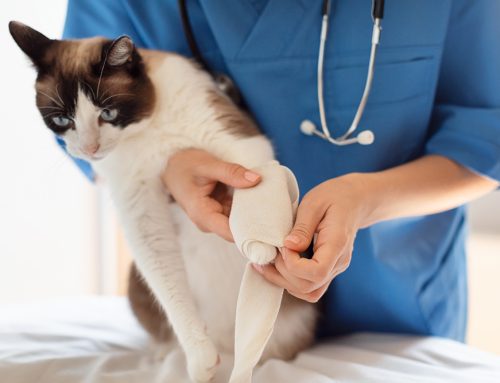Allergy Season Relief for Pets: Helping Dogs and Cats Feel Comfortable Again
When spring settles over Virginia Beach or fall leaves start to swirl, pets with allergies begin to show it. Dogs scratch until their skin reddens, cats shake their heads or lick their bellies raw, and owners are left wondering what’s wrong. Coastal Virginia’s mild climate keeps pollen, mold, and dust circulating for much of the year, making allergies one of the most common reasons pets visit their veterinarian.
At Providence Veterinary Clinic, we provide comprehensive allergy care designed to uncover the cause of your pet’s discomfort and restore lasting comfort. Through diagnostics, treatment, and prevention, our team helps pets breathe easier, sleep better, and enjoy the seasons again. Understanding pet allergies is the first step toward relief.
What Causes Seasonal Allergies in Dogs and Cats?
Seasonal allergies- also called atopic dermatitis– occur when the immune system overreacts to harmless substances like pollen, grass, mold spores, or dust mites. The result is inflammation that causes itching, redness, and secondary skin infections.
Some pets are genetically prone to allergies, especially breeds like Labrador Retrievers, Golden Retrievers, Terriers, and Bulldogs. In Virginia Beach, allergens peak in spring and fall, but high humidity means flare-ups can occur almost any time of year. Even indoor pets are at risk when allergens drift in through open windows, vents, or on clothing.
Regular wellness and prevention visits help identify seasonal patterns early and allow your veterinarian to create a customized plan to keep symptoms under control.
When Untreated Allergies Become a Serious Problem
The itching and inflammation caused by allergies can quickly escalate if left untreated. Broken skin from scratching becomes a gateway for infection, and constant discomfort affects mood, appetite, and sleep. Without veterinary intervention, allergies can develop into chronic, painful skin disease.
Skin and Coat Symptoms
Persistent scratching, chewing at the paws, redness, scabs, and flaky patches are some of the most recognizable allergy signs. Some pets develop allergic hives after contact with grass or pollen. Deep paw infections from excessive licking and inflammation are especially painful. Hot spots occur when pets go overboard with itching and scratching, causing moist, painful skin infections.
Ear Issues
Ear inflammation is another common issue with allergies of every kind. Allergic skin inside the ear canal becomes red and swollen, often leading to ear infections. Common signs include head shaking, odor, discharge, or pain when touched. Chronic cases can cause hearing loss or ear hematomas from repeated head shaking.
Eye and Respiratory Symptoms
Allergic pets may sneeze excessively, rub their faces, or develop conjunctivitis. When rubbing continues, corneal ulcers can form, leading to pain and vision damage.
If symptoms worsen suddenly or your pet develops swelling, call our emergency team during regular hours for immediate assistance.
How Our Team Tackles Allergy Diagnosis
Diagnosis begins with a thorough review of your pet’s medical history, environment, and diet. Because environmental allergies can overlap with other conditions, we look at every possible source of inflammation. Our veterinarians perform targeted tests- such as skin scrapings, fungal cultures, or cytology– to identify infections or parasites that may mimic allergies.
Environmental and Contact Allergies
To pinpoint environmental triggers, diagnostic tools include blood and intradermal skin testing that identify reactions to pollens, weeds, or dust mites. Saliva tests are easy to buy online but should be avoided as they are unreliable.
Keeping a record of flare-ups- when symptoms appear, the weather, or activities before itching starts- helps your veterinarian uncover seasonal patterns and tailor a long-term plan.
Flea Allergy Dermatitis
One of the most common allergy causes in Virginia Beach pets is flea allergy dermatitis. In allergic pets, even one bite can trigger severe itching, redness, and scabbing, especially around the tail base, rump, and inner thighs. Because allergic animals often overgroom, you might never see a flea- but the reaction remains.
Flea allergies are particularly troublesome in Virginia’s mild climate, where fleas thrive indoors and outdoors almost year-round. Maintaining strict parasite prevention is one of the most effective ways to keep allergies under control.
Food Allergies
Food sensitivities can closely mimic environmental allergies, or happen at the same time. The most accurate diagnostic method is an elimination diet trial. Pets need to eat only a novel protein or hydrolyzed protein diet for 8 to 12 weeks, using ingredients they’ve never eaten before. If symptoms get better but return when the original diet resumes, a food allergy is confirmed.
The most common foods that pets are allergic to include chicken, beef, dairy, and certain grains. Food allergies often cause year-round itching or ear infections, making them harder to recognize. Many pets suffer from both food and environmental allergies, so comprehensive testing is key to complete relief.
The Best Treatments for Atopic Dermatitis
Successful management of allergies focuses on three goals: reducing exposure, soothing inflammation, and restoring healthy skin. Unfortunately allergies cannot be cured, but most pets can have lasting comfort with a combination of environmental control, topical care, and prescription therapies.
1. Environmental Control
Simple adjustments to your pet’s routine can make a big impact on allergy symptoms:
- Rinse or wipe your pet’s paws, legs, and belly after time outdoors to remove pollen and debris.
- Run a HEPA air purifier indoors to capture dust and airborne allergens.
- Keep windows and doors closed on high-pollen days to limit exposure.
- Wash your pet’s bedding, blankets, and favorite spots weekly in hot water to eliminate allergens and mites.
- For pets with severe sensitivities, use lightweight shirts or booties during walks to prevent contact with grass and pollen.
These small habits, when practiced consistently, can significantly reduce irritation and help keep seasonal flare-ups under control.
2. Topical Therapy
Topical therapies play a vital role in relieving itch and protecting the skin. Medicated shampoos, mousses, and wipes remove allergens while calming inflammation. During baths, let products sit for 10 minutes before rinsing, paying special attention to paws, bellies, and underarms.
Regular ear cleaning helps prevent chronic ear infections. Consistent grooming also helps remove trapped pollen, dander, and loose hair that contribute to flare-ups.
3. Medications and Prescription Therapies
- Antihistamines may help mild cases but typically provide partial relief.
- Prescription medications like Apoquel or Cytopoint quickly reduce inflammation and stop itching.
- Immunotherapy– customized allergy shots or drops– addresses the immune response directly, helping reduce dependence on other medications over time.
- Laser therapy can complement these treatments by decreasing inflammation, soothing irritated tissue, and speeding recovery from hot spots or infections.
4. Parasite Control
Year-round flea and tick prevention is a requirement for every allergic pet. Fleas are active even in cooler months, and skipping prevention for one cycle can restart severe itching. Flea bites also worsen other allergies, making comprehensive control a must for long-term comfort.

Frequently Asked Questions About Pet Allergies
Can pets outgrow allergies?
Unfortunately, no. Once a pet develops allergies, they usually persist for life, but with proper management and preventive care, symptoms can become far less frequent and much easier to control.
Are allergies contagious?
No. Allergies aren’t infections- they’re individual immune responses. Each pet reacts differently to allergens in their environment.
Can cats develop seasonal allergies?
Yes. Cats can suffer from environmental allergies just like dogs, though their signs are often more subtle. Overgrooming, chewing on the sides or belly, and recurring ear problems can all point to an allergic issue.
Is immunotherapy a safe option?
Yes. Immunotherapy- custom allergy shots or drops prescribed by your veterinarian- is a safe, long-term treatment that helps the immune system become less reactive over time.
Can I give my pet over-the-counter allergy medicine?
Not without veterinary approval. Some human medications can be dangerous or even fatal to pets, so always consult your veterinarian before trying any new product or treatment.
Finding Lasting Allergy Relief in Virginia Beach
Tired of staying up all night listening to your pet scratch? Don’t let them spend another season itching, shaking, or hiding. With the right diagnosis and treatment plan, most pets experience significant improvement within weeks.
To help your pet find lasting relief, contact our team to schedule an appointment. Our veterinarians provide complete allergy diagnostics, advanced treatment options, and compassionate follow-up care designed to keep your pet healthy year-round.
For urgent allergic reactions we offer emergency services – call (757) 495-2961 for guidance.
At Providence Veterinary Clinic, we’re committed to providing thorough, high-quality care for dogs and cats- helping them stay comfortable and carefree in every Virginia season.






Leave A Comment